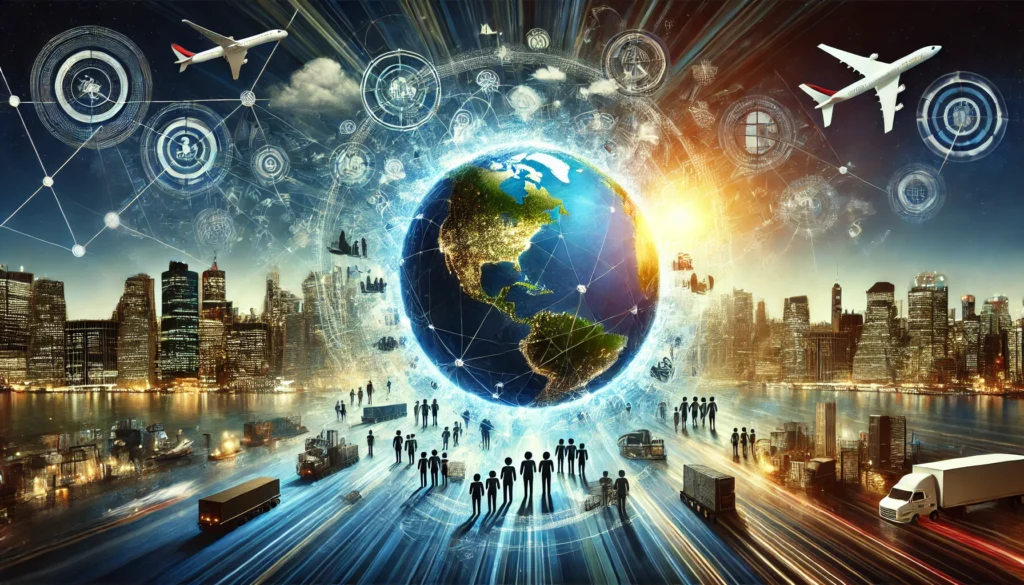

Globalization has shaped economies, societies, and cultures worldwide, making it one of the defining phenomena of the modern era. Technological, commercial, and communication advancements are the driving forces behind this movement, which is typified by the growing interdependence and connectivity of nations. The goal of this blog is to offer a thorough examination of globalization—its causes, impacts, and discussions it has generated.
The History of Globalization
Early Globalization
The phenomenon of globalization is not new. Its origins can be found in antiquity, when East and West were connected by trade routes such as the Silk Road. The flow of goods, ideas, and culture between far-off civilizations was made easier by these early manifestations of globalization.
The Age of Exploration
Globalization significantly accelerated during the 15th and 16th century Age of Exploration. European explorers such as Christopher Columbus and Vasco da Gama paved the way for the unparalleled flow of commodities, people, and ideas by discovering new territories and establishing trade routes.
Industrial Revolution
Globalization was further accelerated in the 18th and 19th centuries by the Industrial Revolution. The time and cost of transporting goods and information around the world were significantly lowered by developments in transportation (such as steamships and railroads) and communication technology (such as the telegraph).
Post-World War ll Era
A new wave of globalization emerged in the years after World War II, marked by the creation of global organizations such as the World Bank, the United Nations, and the International Monetary Fund (IMF). The goals of these organizations were to advance economic stability and global collaboration. In order to promote global trade by lowering tariffs and other trade obstacles, the General Agreement on Tariffs and Trade (GATT), which subsequently evolved into the World Trade Organization (WTO), was established.
The Drivers of Globalization
Technological Advancement
Globalization has been largely propelled by technology. Communication innovations like mobile phones and the internet have made it simpler to communicate with organizations and people worldwide. Global commodities transportation has become less expensive and time-consuming because to innovations in transportation like aviation and container shipping.
Economic Policies
Free trade and investment-promoting economic policies have also been quite important. The movement of capital, products, and services across international borders has been made easier by trade agreements like the European Union’s single market and NAFTA (North American Free Trade Agreement).
Multinational Corporation
Globalization has both causes and effects, and multinational corporations (MNCs) are one of them. These multinational corporations use economies of scale and access to new markets by operating across borders. A more interconnected world has resulted from their worldwide operations, which have integrated economies and cultures.
The Effects of Globalization
Economic Growth
Economic growth has been significantly boosted by globalization. Businesses now have access to new markets, which has raised output and consumption. Access to international markets, technological transfer, and foreign investment have all helped developing nations and aided in their economic growth.
Cultural Exchanges
Cultural interchange has been made easier by globalization, which has increased awareness and respect for other cultures. The world has become increasingly cosmopolitan as a result of the spread of media, music, food, and fashion.
Labor Market Dynamics
Globalization has had a major impact on the world job market. Due to outsourcing and offshoring, it has led to job losses in rich countries as well as job prospects in developing nations. In certain areas, this has exacerbated economic inequality and wage stagnation.
Environmental Impact
The environment has experienced varied results from globalization. Global environmental challenges have garnered greater awareness and collaboration as a result of it, on the one hand. On the other side, because of rising industrial activity, resource extraction, and transportation emissions, it has exacerbated environmental degradation.
The Debates Surrounding Globalization
Economic Inequality
The most divisive topic in relation to globalization is economic inequality. Critics contend that while globalization has helped wealthier nations and people disproportionately, it has made poverty and inequality in less developed areas worse. Political and social unrest have resulted from the unequal distribution of the benefits of globalization.
Cultural Homogenization
There is worry that as a result of cultural uniformity brought about by globalization, regional cultures and customs may be lost. Some people believe that the dominance of Western consumer culture and media poses a threat to cultural diversity.
Sovereignty and Democracy
Concerns concerning democracy and national sovereignty have also been brought up by globalization. The policy options open to national governments may be restricted by international organizations and agreements, raising questions about democratic governance and accountability.
Environmental Sustainability
Another significant worry is how globalization is affecting the environment. The heightened production and consumption linked to globalization have exerted considerable strain on ecosystems and natural resources. The necessity of sustainable development strategies to lessen these effects is becoming increasingly apparent.
The Future of Globalization
Globalization’s future is unclear and will probably be influenced by a number of variables, such as changes in economic and geopolitical conditions as well as technology breakthroughs. The COVID-19 pandemic has brought attention to the weaknesses in global supply chains and spurred debates about the need for increased localization and resilience. Nonetheless, the core forces behind globalization—economic interdependence and technology—are probably going to keep reshaping the world.
Regionalization
Regionalization, where nations concentrate more on bolstering economic relations inside their regions than globally, is one potential trend. This may be the result of initiatives to strengthen supply chain resilience and lessen reliance on distant markets.
Digital Globalization
Globalization through digital means is another new trend. The emergence of digital platforms and technology is opening up new avenues for international cooperation and communication. Digital services, remote labor, and e-commerce are revolutionizing the global economy and society.
Conclusion
The globe has undergone significant transformation as a result of the complicated and varied phenomena known as globalization. Economic inequality and environmental degradation are among the difficulties it has brought about, despite the fact that it has also brought about many positive effects like cultural interchange and economic prosperity. It is imperative to comprehend and tackle these obstacles in order to guarantee that globalization serves the interests of everybody. Future developments of globalization will necessitate a well-rounded strategy that supports environmental sustainability, cultural diversity, and economic growth.
